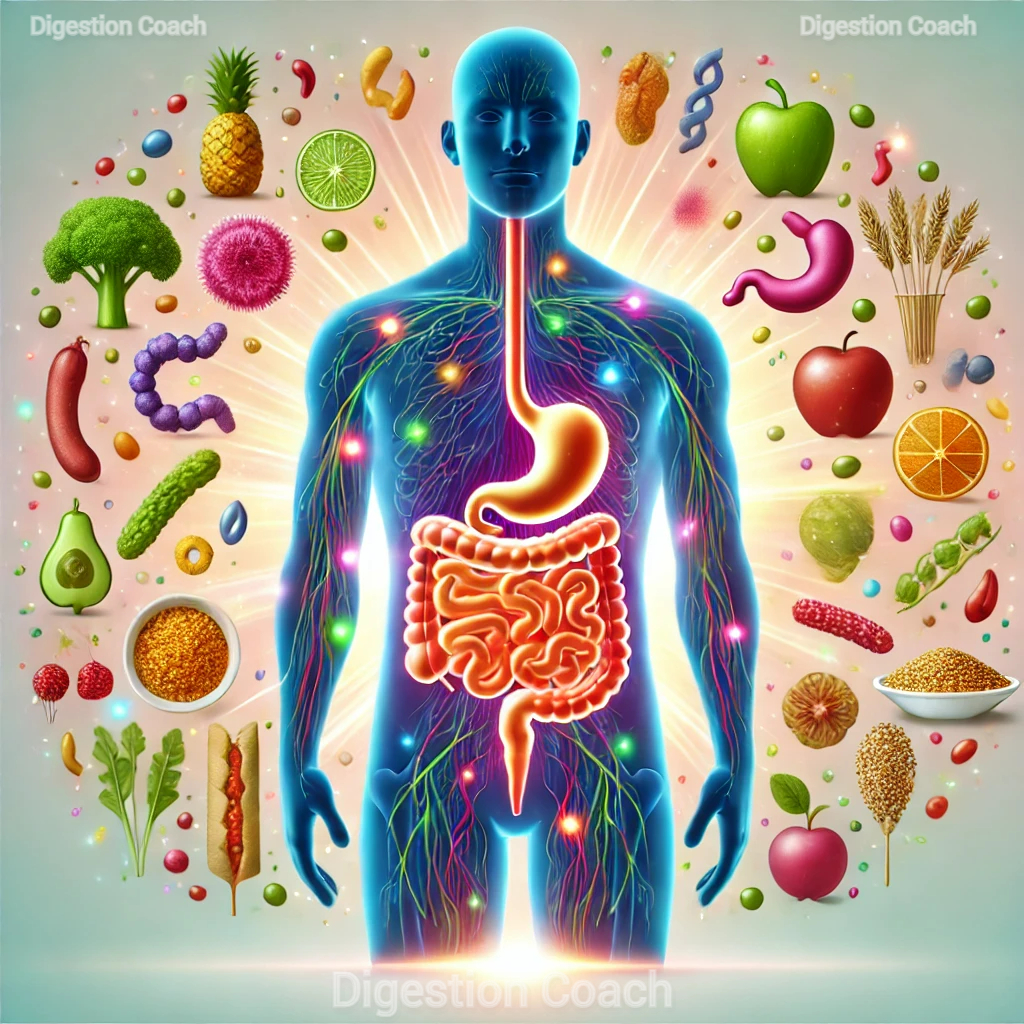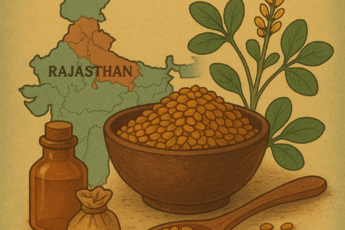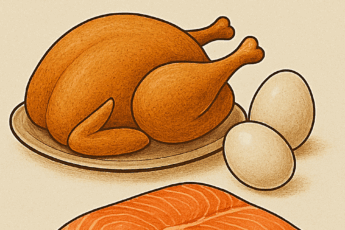Research has demonstrated that consuming a diet rich in specific foods—legumes (lentils, chickpeas, and green peas), fruits (apples and berries), grains (oats, quinoa, and barley), vegetables (onions and leeks), and nuts (walnuts and almonds)—significantly supports the production of short-chain fatty acids (SCFAs) by gut-probiotic bacteria. These SCFAs, including butyrate, acetate, and propionate, play a crucial role in bolstering immune defenses, such as enhancing resilience to viral infections like influenza.
As a digestion coach, I like to share the complex interplay between diet, gut bacteria, and systemic health with my patients, examining the mechanisms, food sources, and potential consequences of neglecting these dietary elements.
The Significance of Short-Chain Fatty Acids (SCFAs)
SCFAs are metabolites produced during the fermentation of dietary fibers by beneficial gut bacteria. These metabolites are indispensable for:
- Gut Barrier Integrity: Strengthening the mucosal layer to prevent the translocation of harmful microbes.
- Regulatory T Cell Development: Supporting immune regulation and preventing excessive inflammation.
- Anti-inflammatory Effects: Reducing pro-inflammatory markers, such as IL-6, linked to severe viral infections.
- Pathogen Defense: Boosting antimicrobial peptide production and enhancing mucosal immunity.
To sustain SCFA levels, dietary fiber—primarily fermentable fiber—must be an integral part of one’s diet. Without these fibers, the gut microbiota can shift toward dysbiosis, characterized by reduced beneficial SCFA-producing bacteria. Optimal SCFA production has been linked to gut health and a reduction in intestinal inflammation and risk of colon cancer development.
Foods that Boost SCFA Production
1. Legumes: Lentils, Chickpeas, and Green Peas
Legumes provide an abundance of resistant starches and soluble fibers that fuel the production of SCFAs.
- Lentils: Rich in galactooligosaccharides (GOS) and arabinogalactans, lentils enhance butyrate production and foster microbial diversity.
- Chickpeas: GOS in chickpeas promotes the growth of bacteria like Faecalibacterium prausnitzii, which is crucial for gut health.
- Green Peas: Containing a mix of fermentable fibers, green peas fortify the microbiome against pathogenic dominance.
2. Fruits: Apples and Berries
These fruits contain prebiotics and polyphenols, which synergize to boost microbial richness.
- Apples: High in pectin, and they selectively promote butyrate-producing bacteria.
- Berries: Abundant in fiber and bioavailable polyphenols, and berries enhance both SCFA synthesis and systemic antioxidant defenses.
3. Grains: Oats, Quinoa, and Barley
Whole grains offer fermentable fibers, beta-glucans, and resistant starch that enhance SCFA production.
- Oats: Beta-glucans in oats are particularly effective for promoting Ruminococcus spp., a butyrate producer.
- Quinoa: A pseudograin rich in diverse fiber types that encourage acetate and propionate production.
- Barley: High in resistant starch and arabinoxylans, barley supports Roseburia and Eubacterium rectale, pivotal in butyrate synthesis.
4. Vegetables: Onions and Leeks
- Onions: A significant source of inulin, onions foster the proliferation of beneficial microbes like Bifidobacteria, known for their anti-inflammatory properties.
- Leeks: With high inulin and fructooligosaccharide (FOS) content, leeks are prebiotic powerhouses supporting microbial balance and SCFA production.
5. Nuts: Walnuts and Almonds
- Walnuts: Containing fibers and polyphenols, walnuts elevate SCFA producers like Lachnospiraceae while curbing inflammatory pathways.
- Almonds: Almonds encourage SCFA production while supporting the growth of healthy bacteria such as Bifidobacterium.
Microbial Impact of Diet
An important gut optimization tip is consuming a diet rich in SCFA-supporting foods, encouraging a surge in beneficial bacterial populations, such as Faecalibacterium prausnitzii and Ruminococcus spp. These microbes are indispensable for immune modulation, inflammation reduction, and overall health maintenance.
In contrast, diets deficient in SCFA-supporting foods can cause harmful shifts in the gut microbiota. Overgrowth of Enterobacteriaceae species, such as Klebsiella pneumoniae, Shigella, E. coli, Proteus, and Citrobacter, has been linked to:
- Chronic inflammation.
- Gut barrier dysfunction.
- Increased susceptibility to infections and metabolic disorders.
This microbial imbalance underscores the pivotal role of a fiber-rich diet in preventing inflammation and associated diseases.
Connection Between SCFAs and Viral Immunity
SCFAs influence the body’s response to viral threats through:
Enhanced Lung Health: By regulating alveolar macrophages and bolstering antiviral defenses.
Anti-inflammatory Effects: Limiting cytokine storms in severe viral infections.
Strengthened Mucosal Immunity: Increasing the production of mucins and secretory IgA.
Conclusion
A diet abundant in legumes, fruits, grains, vegetables, and nuts is a powerful tool for maintaining a healthy gut microbiota, enhancing SCFA production, and fortifying immunity. These nutrient-dense foods not only encourage the growth of beneficial bacteria but also prevent the dominance of pathogenic species linked to inflammation and disease. As a three-and-a-half-decade practicing doctor and digestive coach, I recommend making these dietary choices a habit. You will gain significant strides toward better overall health and enhanced resistance to bacterial and viral infections, as well as chronic diseases.
FAQs
- What are SCFAs, and why are they important? SCFAs are metabolites produced by gut bacteria during fiber fermentation. They are essential for gut health, immune regulation, and reducing systemic inflammation.
- How do dietary fibers promote SCFA production? Fermentable fibers act as fuel for beneficial gut bacteria, which convert them into SCFAs.
- Can improving gut health really boost immunity? Yes, a healthy gut microbiota supports immune function by enhancing the gut barrier, regulating inflammatory responses, and producing antimicrobial compounds.
- Why are grains like oats and barley emphasized for SCFA production? Grains provide unique fibers, such as beta-glucan, which selectively feed SCFA-producing bacteria and modulate inflammation.
- What happens if I avoid these foods? A diet devoid of fiber-rich foods can lead to gut dysbiosis, which is characterized by reduced beneficial bacteria, overgrowth of harmful species, and increased inflammation.
Similar Information
Ecological dynamics of Enterobacteriaceae in the human gut microbiome across global populations
Eating Fiber Could Protect You From Infections. Here’s Why.
Feeding your good gut bacteria through fibre in diet may boost body against infections
Study shows short-chain fatty acids produced by probiotic bacteria in the gut can boost immunity against influenza and other viral infections
COMPLEMENTARY 15-MINUTE CALL
Take your first step toward a renewed sense of well-being. Call today to arrange a complimentary 15-minute consultation.
Let’s discern whether my approach aligns with your needs.
I look forward to connecting with you at 714-639-4360.
Polyamines and SCFAs + B Vitamins: The Gut-Neurological Link










